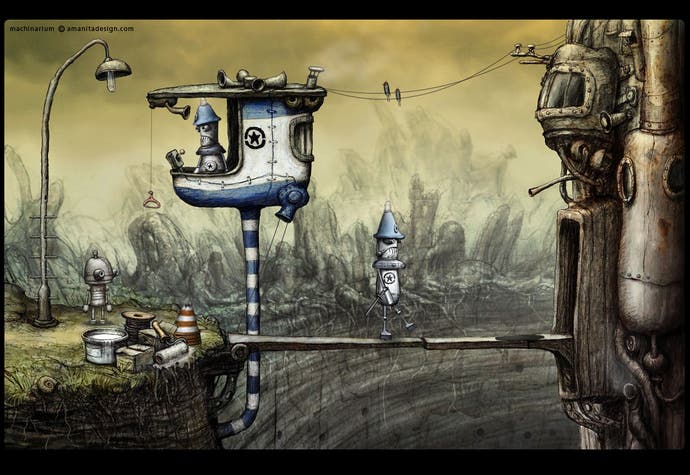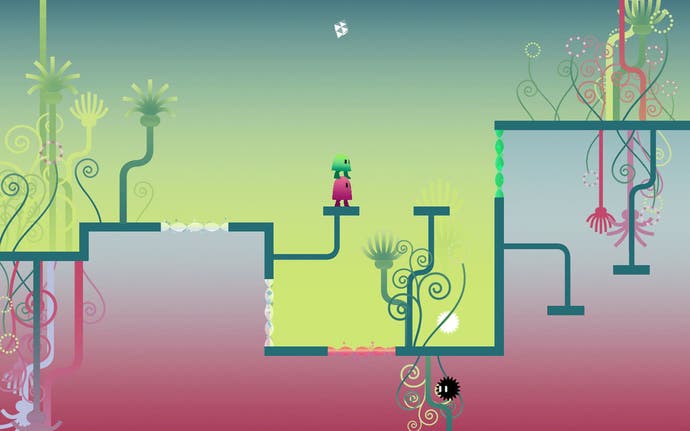IndieCade Roundup
Is next year's Braid or Everyday Shooter in here?
levelHead
Dark Room Sex Game wasn't the only technological experiment - or brave control method - at IndieCade. Although unstable and fiddly to play, levelHead was an amazing demonstration of the potential of camera control in games.
It's a maze game, basically. The player holds a patterned cube in front of a camera; on-screen, a room appears inside the cube, and you guide a silhouetted man through it by tilting the cube gently. When he moves on to a new room, you'll need to spin the cube round to the appropriate face to see him. Once he's completed the cube, reach for a new one to continue the journey. It's probably better explained by watching a video of the game in action.
A rewarding 3D spatial puzzle - IndieCade calls it "a 21st-century Rubik's Cube of sorts", perhaps with some design input from Escher - levelHead is also a surreal and quite magical experience. Game designers have been so focused on putting the player in the game world, they perhaps haven't realised the power - no less immersive - of putting the game world in the player's hands. We'd love to see this technology developed for the 360's Vision Camera, or PlayStation Eye.
Another brilliant puzzle/adventure - though much more conventional - was Machinarium. IndieCade presented an exclusive look at the first few screens of the "full-scale adventure game" from Amanita Design, makers of Flash sensation Samorost. It's an absorbing puzzler about a discarded robot, with gorgeous, melancholy hand-drawn graphics steeped in the rich history of Czech animation. We can't wait for its release next year.

ibb and obb
The indie game creator's genre of choice was once the bullet-hell shmup or twin-stick shooter, but this year's IndieCade was all about mechanically elaborate 2D platform games. They ranged from Cactus' befuddling Psychosomnium to our clear game of the show, the gorgeous and devastatingly clever co-op platformer ibb and obb. But we'll get to that in a second.
Where Is My Heart? was pure post-Braid indie game: retro graphics, puzzles, jumping and a theme "that explores family relationships". Perhaps, but it chose to do so through the ultimate platforming cliché (switch between different characters for their special abilities!), so we moved on. More successful was Gravitation, a touching little platform-poem in which the display contracts and the player's jumps weaken if he doesn't go home to play ball with his son.
For a focus on gameplay over message, we turned to the time-bending, silent-movie world of The Misadventures of P. B. Winterbottom. This umbrella-wielding Edwardian gent creates copies of himself using a rewind button to solve obstacles, a fascinating idea fudged by awkward controls and design.
Not so with Dutch student Richard Boeser's ibb and obb. Although this graduation project was present as only a single prototype level, it stunned with its slick presentation, perfectly-tuned controls and imaginative design. It's a co-operative platform game that plays Mario Galaxy-style tricks with gravity, reversing it around the line of ground in the middle of the screen.

The two cheerful blobs ibb and obb (named after Jasper Fforde characters) need to help each other destroy monsters and solve puzzles, jumping from one side of the gravity plane to the other to maximise score. There are some brilliant touches here, with skilful players using a slingshot technique through multiple portals to reach seemingly impossible platforms.
In raw gameplay terms, the ingenious ibb and obb had by far the most potential at this year's IndieCade. It's the easiest to see earning crossover success on Live Arcade, PSN, Steam or WiiWare in the long run - but, frustratingly, it's also one of the furthest from completion.
Even if it never sees the light of day, though, ibb and obb provides plenty of reasons to be cheerful. The fact that one of the oldest tropes in gaming - something that can be distilled to left, right, and jump - can be reinvigorated and reinvented by one smart young man working on his own is a reminder of why we all fell in love with this medium in the first place: in videogames, anything is possible.








